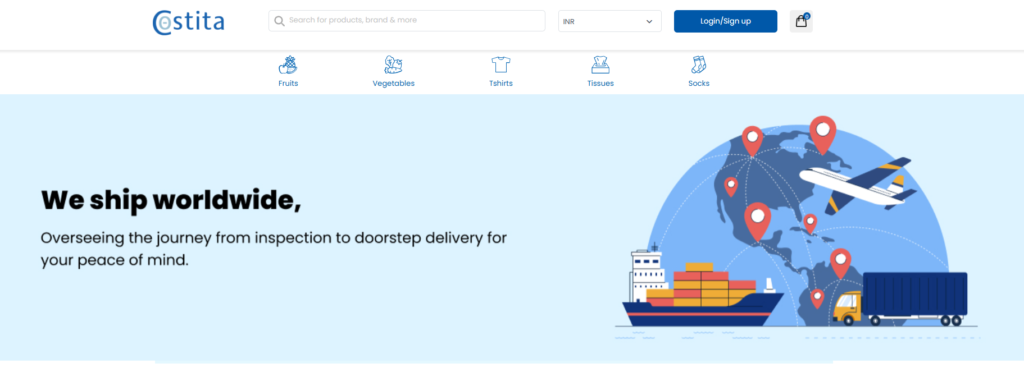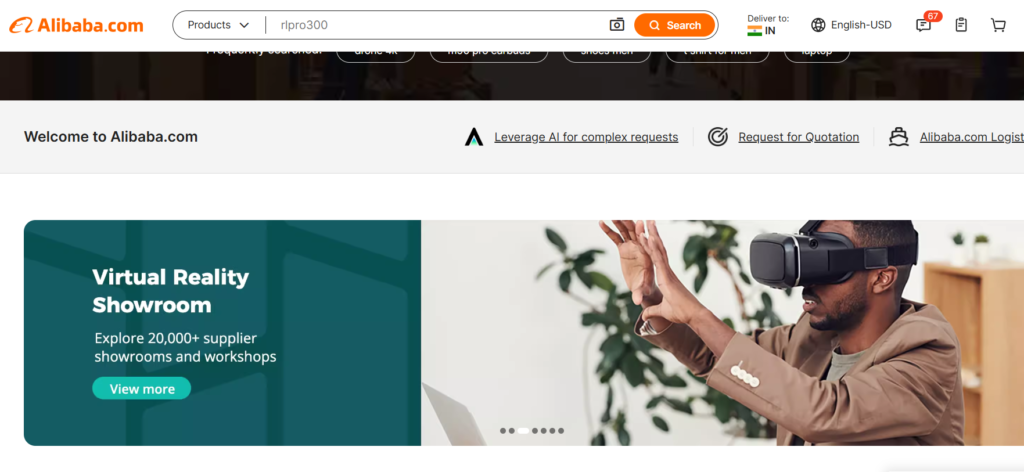
B2B eCommerce vs. Traditional Wholesale: Which Model Is Winning in 2025?
B2B eCommerce is revolutionizing the way businesses operate, offering unprecedented scalability and efficiency compared to traditional wholesale markets. This digital-first approach is transforming global trade, driven by advancements in technology and shifting buyer behaviors. While the traditional wholesale market has long been a cornerstone of commerce, its reliance on manual processes and relationship-based transactions is becoming a limitation in an increasingly digital world. B2B eCommerce companies like Costita Global Chain Private Limited are leading this shift, providing businesses with the tools and expertise to transition from outdated methods to cutting-edge B2B eCommerce platforms. This transformation is not only reshaping how businesses connect but also redefining the benchmarks for success in 2025 and beyond.
The B2B eCommerce industry is on an accelerated growth trajectory, with an estimated annual growth rate of 18% until 2030. This rapid expansion underscores the increasing adoption of digital platforms for business transactions. Technologies like ERP systems play a pivotal role, offering seamless integration of supply chains, enhanced customer experiences, and improved operational efficiency. For instance, Costita provides advanced ERP solutions that help businesses streamline workflows, reduce costs, and improve overall efficiency. The incorporation of AI in procurement within the B2B eCommerce sector has further expanded its wings to present quick and instant services.

The scalability of B2B eCommerce platforms enables businesses to break geographical barriers and connect with global markets. By reducing the dependence on physical locations, businesses can lower overhead expenses and focus on growth. Costita’s tailored solutions ensure a smooth transition for companies, allowing them to harness the full potential of digital commerce. Additionally, these platforms enable businesses to manage inventory effectively, ensuring that customer demands are met promptly.
Marketplaces have become the backbone of B2B eCommerce, with 80% of buyers favoring these platforms over traditional methods. By 2024, marketplaces accounted for 67% of global online sales, showcasing their dominance in the digital trade ecosystem. These platforms provide businesses with unparalleled access to diverse product offerings, fostering convenience and operational simplicity.

Costita excels in equipping businesses with tools to maximize their presence on leading marketplaces. From optimizing product listings to managing dynamic pricing strategies, Costita ensures that businesses can stand out in competitive environments. Their expertise in leveraging marketplace algorithms allows businesses to reach a broader audience and secure more sales. This shift in the wholesale market in India is particularly relevant, as local businesses are beginning to embrace the marketplace model to stay competitive.
In India, where the traditional wholesale market has long been dominant, the growing adoption of B2B eCommerce platforms represents a significant change. Businesses are recognizing the advantages of marketplaces, including streamlined procurement, faster transactions, and enhanced product visibility.
Despite its rapid growth, B2B eCommerce faces challenges in providing personalized experiences. Only 57% of businesses currently offer customer-specific pricing, a capability that is highly prioritized by 46% of companies for future development. Personalization is critical in building strong customer relationships and driving repeat business.
To address these challenges, Costita integrates advanced data analytics and customer segmentation tools into its B2B eCommerce platforms. This enables businesses to offer tailored experiences, such as customized pricing and product recommendations, enhancing customer satisfaction and loyalty. In contrast, the traditional wholesale market often lacks the technological infrastructure needed to deliver such personalization.
Personalization in B2B eCommerce also extends to marketing strategies. Costita provides businesses with tools to create targeted campaigns, ensuring that messaging resonates with specific customer segments. By leveraging data-driven insights, businesses can refine their offerings and improve conversion rates.
Hybrid selling models, which blend online and offline sales strategies, are emerging as a key trend in the B2B eCommerce landscape. These models cater to diverse buyer preferences, offering the flexibility of digital transactions alongside the personalized touch of traditional methods. Hybrid approaches are particularly effective in industries with complex purchasing cycles, where human interaction remains vital.
Costita specializes in implementing hybrid selling strategies that integrate CRM systems, omnichannel communication, and automated workflows. By combining the best aspects of both digital and traditional approaches, businesses can offer a seamless and engaging buyer journey. This approach is particularly beneficial for businesses in the wholesale market in India, where relationship-based transactions are still valued.
Hybrid models also provide businesses with the agility to adapt to changing market conditions. For example, during periods of high demand, digital channels can handle increased order volumes, while offline interactions can be reserved for more complex negotiations.
The traditional wholesale market is characterized by bulk sales, negotiated pricing, and long-term relationship-building. These markets have historically been the backbone of commerce, especially in regions like India, where they cater to a wide range of industries. However, their reliance on manual processes and outdated systems has made them less competitive in the modern trade environment.

India’s wholesale market is vast and diverse, encompassing sectors such as agriculture, textiles, electronics, and construction. Despite its size, the wholesale market in India struggles to keep pace with the agility and efficiency of B2B eCommerce platforms. Many businesses still rely on traditional practices, limiting their ability to scale and compete in a globalized market.
Costita recognizes the untapped potential of the wholesale market in India and collaborates with businesses to modernize their operations. By introducing digital tools and strategies, Costita helps wholesalers adapt to changing market demands, ensuring long-term sustainability and growth. For example, the integration of a B2B eCommerce platform can significantly improve operational efficiency and customer reach.
The wholesale market in India is also evolving due to the increasing demand for faster delivery times and transparent pricing. Costita’s solutions address these needs by streamlining supply chain processes and providing real-time inventory updates.
Traditional wholesalers face numerous operational challenges, including inventory mismanagement, logistical inefficiencies, and inconsistent customer service. These issues not only increase costs but also hinder the ability to compete with digitally-enabled businesses.
Costita’s expertise in supply chain optimization and process improvement addresses these inefficiencies head-on. Their comprehensive solutions include inventory management systems, real-time tracking tools, and customer service enhancements, enabling wholesalers to operate more efficiently and effectively. These solutions are essential for traditional wholesale markets aiming to compete with modern B2B eCommerce companies.
Furthermore, Costita helps businesses implement demand forecasting tools, ensuring that inventory levels align with market trends. By reducing stockouts and overstocking, businesses can improve profitability and customer satisfaction.
In the B2B eCommerce model, businesses adopt a digital-first approach, leveraging automated processes that streamline operations. This approach eliminates the dependency on traditional, manual workflows, enabling businesses to scale effortlessly and manage larger transaction volumes with minimal overhead. By using B2B eCommerce platforms like those provided by Costita, companies can integrate their supply chain, manage inventory in real time, and optimize order processing.
Conversely, traditional wholesale markets focus on bulk sales with pricing negotiated through personal relationships. These interactions, while valuable for long-term partnerships, are often slow and inefficient. Manual order processing and reliance on physical documents contribute to delays and increased costs, making this model less adaptable to dynamic market demands.
B2B eCommerce platforms prioritize online convenience, offering features like real-time communication and data-driven insights. Customers can easily track orders, compare prices, and access personalized recommendations through user-friendly interfaces. Costita’s platforms further enhance customer experience by integrating CRM tools, enabling businesses to maintain detailed customer profiles and deliver personalized solutions.
In traditional wholesale markets, interactions are heavily relationship-focused and often require face-to-face meetings or lengthy communication over phone calls. While this approach fosters trust, it is less efficient in today’s fast-paced business environment. The lack of real-time order tracking and digital communication channels can frustrate customers seeking quick and transparent solutions.
B2B eCommerce is experiencing an impressive 18% annual growth, driven by rapid technological advancements and the globalization of trade. This growth is fueled by the ability of B2B eCommerce platforms to adapt to market trends, expand reach, and cater to diverse customer needs efficiently. Costita supports this growth by providing cutting-edge tools that allow businesses to scale seamlessly.
In contrast, the growth of traditional wholesale markets is slower due to their reliance on conventional methods. Limited adoption of digital technologies and inefficiencies in logistics and communication hinder their ability to compete with more agile B2B eCommerce companies.
B2B eCommerce platforms are increasingly capable of delivering personalized experiences, though some challenges remain, such as implementing customer-specific pricing. Costita addresses these challenges by integrating advanced data analytics, enabling businesses to analyze customer behavior and offer tailored solutions. Features like dynamic pricing and personalized marketing campaigns further enhance customer engagement.
Traditional wholesale markets, on the other hand, rely on long-term relationships for personalization. While these relationships can lead to trust and loyalty, they lack the scalability and precision of digital personalization tools. Without data-driven insights, traditional wholesalers are unable to meet the evolving expectations of modern buyers.
Efficiency is a hallmark of B2B eCommerce platforms, which leverage technology to reduce costs and improve accuracy. Automated workflows, real-time inventory management, and seamless integration with logistics providers ensure that operations are streamlined. Costita’s expertise in operational optimization helps businesses reduce errors, minimize delays, and improve overall productivity.
In traditional wholesale markets, reliance on manual processes often results in inefficiencies. From inventory mismanagement to delayed order fulfillment, these challenges can significantly increase operational costs. Costita helps traditional wholesalers modernize their operations, enabling them to compete with digitally enabled businesses.
Marketplaces play a central role in B2B eCommerce, with 80% of buyers preferring them for their convenience and diverse product offerings. These platforms simplify procurement by providing a one-stop shop for businesses. Costita helps businesses establish a strong presence on marketplaces, optimizing listings and leveraging data to enhance visibility.
In traditional wholesale markets, marketplace adoption remains limited, with only 25% of vendors utilizing digital channels. This lack of digital integration restricts their ability to reach new customers and adapt to changing buyer preferences. Costita’s solutions bridge this gap, enabling traditional wholesalers to embrace marketplaces and expand their reach.
The future of B2B trade is being shaped by the growing dominance of B2B eCommerce platforms. Businesses that embrace digital transformation will benefit from enhanced scalability, operational efficiency, and customer satisfaction. In contrast, traditional wholesale markets must evolve to remain relevant in this rapidly changing environment.
Costita Global Chain Private Limited is at the forefront of this evolution, offering cutting-edge solutions that empower businesses to succeed in the digital era. From marketplace integration to personalized buyer experiences, Costita provides the tools and expertise needed to navigate the complexities of modern trade.
The hybrid model of trade, combining digital and traditional elements, is likely to become the standard in industries requiring personalized service. By leveraging both approaches, businesses can maximize customer satisfaction and maintain competitiveness.
B2B eCommerce is redefining the trade landscape with its unmatched scalability, efficiency, and ability to meet evolving buyer demands. As businesses continue to prioritize digital-first strategies, B2B eCommerce is set to become the dominant model in global trade. While the traditional wholesale market remains significant, its future depends on its ability to adapt and integrate modern technologies.
Costita Global Chain Private Limited exemplifies leadership in this space, guiding businesses through their digital transformation journeys. By leveraging their industry expertise and innovative solutions, Costita ensures that businesses can not only survive but thrive in the competitive world of B2B trade.
B2B eCommerce refers to the online buying and selling of goods and services between businesses. It leverages digital platforms to streamline transactions, improve efficiency, and expand market reach.
B2B eCommerce focuses on digital-first interactions, scalability, and automation, while traditional wholesale relies on bulk sales, negotiated pricing, and relationship-based interactions.
The growth of B2B eCommerce is driven by technological advancements, changing buyer behaviors, and the need for personalized and efficient business interactions.
Traditional wholesale markets often struggle with operational inefficiencies, inventory mismanagement, and slow adoption of digital technologies.
Costita provides tailored solutions, including marketplace integration, process optimization, and advanced personalization tools, to help businesses succeed in the digital trade ecosystem.
Yes, hybrid models that combine the strengths of both approaches can cater to diverse buyer preferences and enhance overall customer satisfaction.
The wholesale market in India is vast and diverse, catering to various industries. However, it faces challenges in adapting to digital trends, which creates opportunities for modernization and growth.
Marketplaces provide a centralized platform for buyers and sellers, offering convenience, a wide selection of products, and streamlined procurement processes.
Industries such as manufacturing, retail, agriculture, and pharmaceuticals benefit significantly from the scalability and efficiency of B2B eCommerce platforms.
Businesses can stay competitive by adopting B2B eCommerce platforms, leveraging advanced technologies, and focusing on delivering personalized and efficient buyer experiences.
Our email address will not be published.Required fields are marked *
